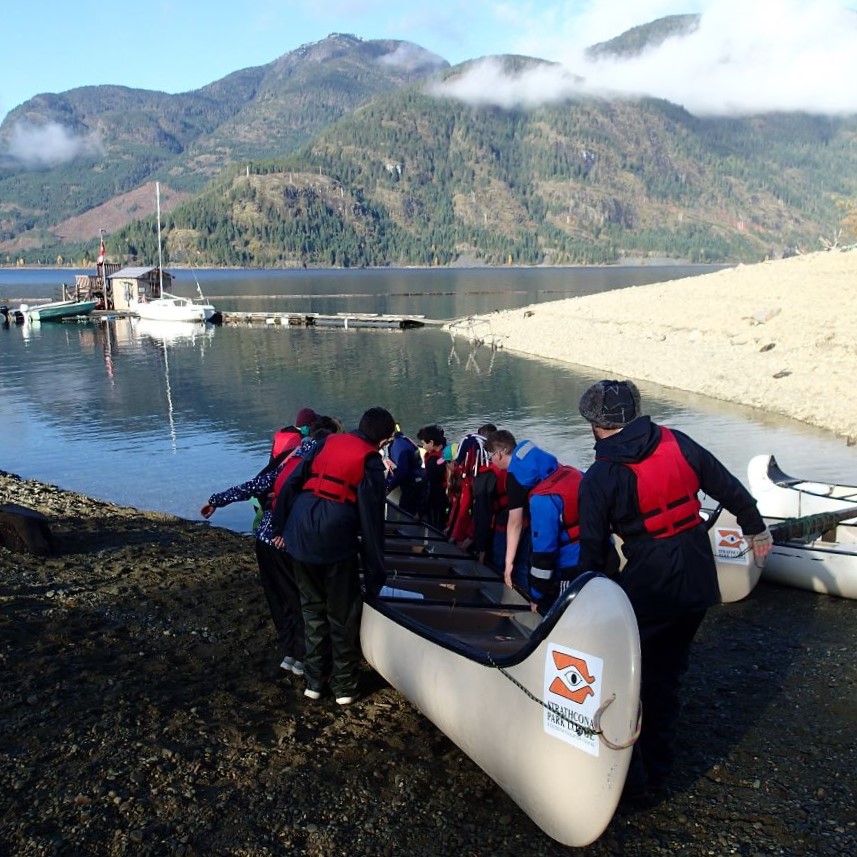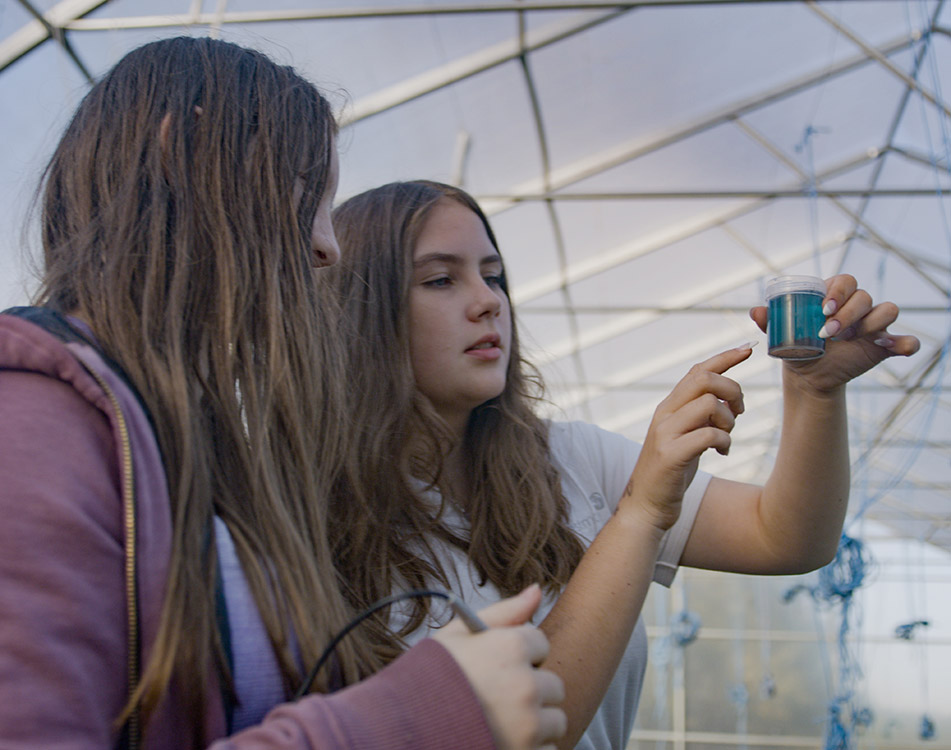Confident. Self Aware. Capable.

Middle School
The Westmont Middle School program for grades 7 and 8 is an integration of the latest research in human development, trends in education, and Montessori philosophy.
The mission of the program is to provide opportunities for adolescents to
- Build self-confidence
- Gain self-knowledge
- Belong to a caring and supportive community
- Learn to be adaptable
- Be academically competent and challenged
- Create a vision for their personal future
Simply put, our method truly empowers early adolescents.
Middle school is a sensitive time for students. Westmont’s caring and supportive culture and community is an essential element of this program’s success. When we feel safe and supported, learning expands and deepens quickly.
Stories from Middle School
The Montessori Middle School Model
Dr. Maria Montessori wrote an educational plan for students through elementary and wrote about her vision for the adolescent years. Dr. Elisabeth Coe, a Montessorian from Houston, Texas designed a curriculum that is used by the majority of American Montessori Society schools. There are three main components she wrote about that she used as frames for designing the curriculum for adolescents. The following excerpts are from Dr. Coe’s writings about developing the curriculum:
Developmentally Responsive
In the spirit of Montessori philosophy, the theory of looking to developmental stages as a guide is crucial. The notion of respecting people for where they are in their development and utilizing their unique developmental stage in order to support the unfolding process of growth is a basic foundation of Montessori educational design. The program is designed with the biological, cognitive, and psychosocial development of the adolescent at its core.
Holistic
The word “holistic” is another major element of Montessori philosophy. This means three things: First, that the focus of education should be on the whole child for optimal health and growth: including the cognitive, physical, psychosocial and moral aspects of the person. Second, the areas of study need to be interrelated so that the child understands the inter-connections of life. Third, having student-parent-teacher partnerships is an integral part of a complete, healthy, optimal learning environment.
Empowering

12 Key Elements of Middle School
Academic Work
In an academic year, there are five cycles of work that includes an immersion week at the end of each cycle. Each cycle is six weeks. The fifth week of the cycle is a synthesis of what was learned: cycle theme tests, vocabulary tests, projects, and presentations. The cycle format is designed to help students learn organizational, decision-making, and time-management skills. Students keep a graph of the work completed each week. All academic work is due every Thursday at 4:30 p.m.
Daily Work
Daily work consists of math problems, literature reading and responses, apprentice sentences and personal reflections.
The math work involves a math lesson and practice problems. Upon completion of the lesson, students should check their work and correct any errors. Each student will be given the math answers. If a student needs help on any problems, they are to indicate the problem numbers at the top of the page and ask for assistance the next day. Students take a quiz every week and at the end of each cycle there is a comprehensive test. There is also an end of year test that encompasses all math topics covered up to that point. Math work should take approximately 30-60 minutes per day.
Daily language work requires approximately 45 minutes each day for reading a text and responding to it using the Writing about Reading Strategies presented in class. Each week, students choose the readings by working in their small group. They read each day, and respond, by writing a minimum of five sentences or 100 words. There are also choices for poems or drawings, but there must always be a written response. Each week (except week five) there will be an Apprentice Sentence, with daily steps to completion. Both a first draft and revised draft are required. Apprentice sentences are shared on Thursday. Writing process pieces are completed using all of the steps of the writing process, with a final piece published during week five of the cycle. Students are scored on a rubric to show mastery. All written work is compiled in their writer’s notebooks.
Parents are asked to support their adolescent by providing a family schedule that allows time and space each evening for schoolwork. For concentrated learning to occur, students should study without the distractions of television and phones. Student’s work assignments are given out at the beginning of each cycle. Thus students know their assignments in advance so they can learn to plan ahead and avoid conflicts or late night studying. The first time a student does not complete his/her daily work or bring necessary belongings to school, he/she completes the top section of the parent communication form and consults with a parent to create a plan to complete the assignment. The second time a student does not complete his/her daily work or bring necessary belongings to school, he/she fills out the bottom of the parent communication form with a plan to complete the assignment and takes it home to be signed by a parent. The third time a student does not complete his/her homework or bring necessary belongings to school, a conference is held and an action plan is initiated (see the parent communication form in the appendix).
Individual and Group Work
The school day is divided into two kinds of work: individual and group work.
Individual Work: Individual work is designed to make a match between the skills, abilities, and interests of each student, and there are a variety of work choices in every academic area to be done alone or in small, self-chosen groups. Individual work is assessed individually with mastery tests that may be written or oral. Individual work allows each student to work at a level that challenges and interests them.
Group Work: Group work is done in randomly chosen groups in which individuals learn to work together for five weeks. These groups work together on physical tasks such as the school business and academic tasks in the thematic units, which integrate all subject areas. Individual written tests, group presentations, and self-assessments of the group process address the thematic unit.
Immersion Weeks
During the year, students will attend six immersion weeks (out-trips). Why schedule immersion weeks?
- Transition: In her writings about adolescents, M. Montessori talks about the need for a change in pace.She talks of a year being too long a period to focus on.Breaking the year into six week cycles allows students to reflect on their progress and decide what they would like to change for the following six weeks.Immersion weeks offer a clear transition from one six week cycle into the next.
- Community: Our other main goal is community building.By spending a full four days together, the students get to see and support each other in new and unfamiliar situations, thus building a stronger community.In community, the goal is not always to enjoy each other, but to respect and make room for each other.Immersion weeks help build that faculty.
- Application: At its best, the immersion week offers the students an opportunity to apply what they’ve learned throughout the cycle in practical situations and in new surroundings.
- Service: A long term goal for immersion weeks is to provide service back to the community.
Mastery of Learning
Mastery learning is a form of personalized learning that gives students the necessary time to master skills before progressing to the next level of work. The student takes on the responsibility of learning a skill versus merely accepting a low grade and never really learning the information. The teacher’s job is to break down the learning steps, to offer suggestions for internalizing the knowledge, and to give the time necessary to learn the information.
According to research, the advantage of mastery learning is that it offers clear expectations, fosters mastery of a unit of study, is not competitive, and encourages student responsibility. Its disadvantage, as listed by researchers, is that too many students receive A’s.
The student’s cycle reports indicate that courses have been completed with at least 80% mastery. The procedure is to offer information, provide learning strategies and activities, provide a variety of assessments – performance assessment with rubrics scale, quizzes, written tests, and self-assessments – and re-teach and retest if necessary. Quizzes are to give feedback during the learning process and require an 80+% score. Tests are given at the closure of a body of work such as after the completion of an area of study in social world, natural world, math, and language.
Tests are always corrected, no matter what the score, for learning. In the event that a retest has to be taken, all subsequent tests will be more in-depth; therefore, certain criteria must be met before a retest is administered such as: reviewing previous material, completing supplemental work, and receiving additional instruction from a teacher when necessary.
Physical Education
Physical education is an important part of a holistic education. Students can choose to change into their PE uniform at school or come dressed upon arrival at school. All students must change into their school uniform after the PE lesson. Students will be asked to actively participate in all physical activities. If a student is unable to participate for medical reasons, this needs to be documented by a note from the parents. When students cannot be actively engaged, they may walk on the school grounds or do another activity designated by the P.E. teacher.
Personal Reflection
As part of the health curriculum, students spend thirty minutes each day after lunch in personal reflection. Dr. Montessori felt that early adolescents have a quest for self-knowledge, which in turn helps adolescents develop their identity. In our hurried society, we want the students to learn to spend time reflecting on goals, reducing stress, and creating a personal vision. During this time, students will work by themselves on guided, self-knowledge activities that are recorded in a notebook as relaxing music is played. Students will participate in Heroic Journey during cycle year B and 7 Habits of Highly Effective Teenagers during cycle year A.
Study Hall
Study Hall is from 3:30 – 4:30 p.m., Monday to Thursday. Study Hall provides an appropriate environment for students to complete daily work and get help. It gives students the opportunity to get homework done before starting extra-curricular activities or relaxing for the evening. It is an area where students can have quiet time for completing homework.Study Hall is a quiet space to allow students to focus. It is not a time for socializing and it is not a daycare service. Students who are disruptive to those studying or disrespectful to the teacher may be asked to leave.
Family Potlucks
A potluck is held each cycle for all middle school students and their families. This a time to build community within the middle school but to also share important information for the coming cycle. The first potluck is held in late August to welcome families to the program or to welcome returning students.
Small Businesses and Class Business
Middle School students run student selected business(es), and the profits defray some of the costs of out-trips. Food items offered by the students follow the nutrition guidelines. Having students run and operate a business helps students to develop valuable and lifelong skills.
These businesses will be run throughout the year and the goal will be for the students to learn through process and feedback, not through final product. To maximize the student’s growth and independence, we ask that parents do not provide support beyond transportation to the store to purchase supplies if necessary. Students will write a proposal and receive a loan from the Wolf business account, if necessary. We will provide students with a strong foundation for how to run a business and then they will work independently to pull it off.
Stunning Nature
Maria Montessori said, “When students come into contact with nature, they reveal their strength.” We see it every day and are profoundly grateful for the 160+ acres of forest-meets-ocean splendour that Westmont students have to explore, connect and learn.
Check out our Stunning Nature page herefor a campus and drone tour!
Safe, Caring Adolescent Community
Middle school is a sensitive time for students. Westmont’s caring and supportive culture and community is an essential element of this program’s success. When we feel safe and supported, learning expands and deepens quickly.
“An education capable of saving humanity is no small undertaking; it involves the spiritual development of people, the enhancement of their value as an individual, and the preparation of young adults to understand the times in which they live.”


